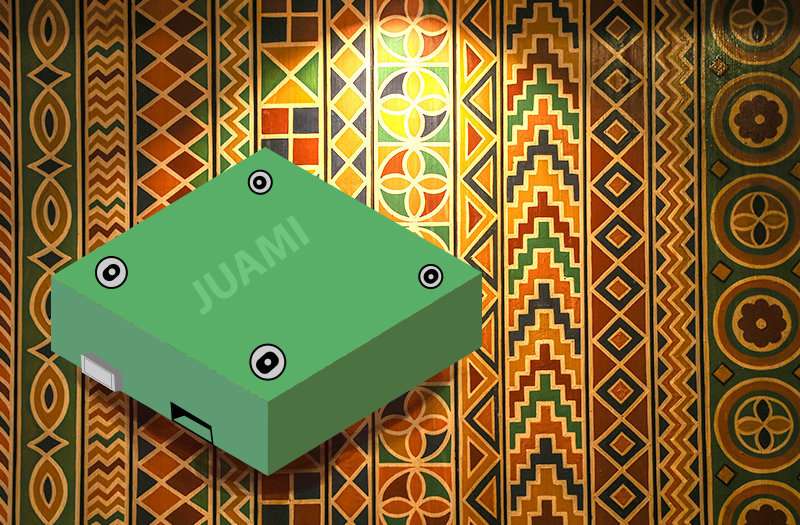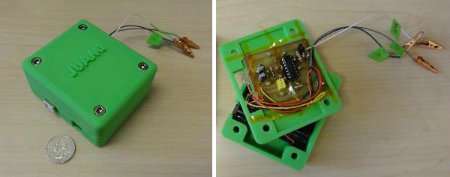Low-cost science kits help fill experimental gaps facing African college students

Having access to basic equipment like test tubes and centrifuges to perform simple science experiments is a given in most American universities. Not so in Africa, where students face a shortage of equipment needed to undertake even basic laboratory experiments.
USC Dornsife chemistry graduate student Betsy Melenbrink is a member of an international team of materials science graduate students aiming to help fill the void by building a low-cost electrochemistry device for use in that part of the world.
The group has designed and built a device known as a potentiostat, the hardware used in most electrochemistry experiments. Bright green and small enough to fit in a hand, resembling a video game controller, it's now in early testing at African universities in Malawi, Tanzania and Kenya. A wider rollout is planned later this year.
Considered a backbone of modern electrochemistry, potentiostats yield important information for food- and drug-quality testing, environmental monitoring, and rapid DNA detection, as well as in the classroom.
The teaching kit fits into a small cardboard box and can be easily shipped. It includes the potentiostat, powered by an open-source electronics platform, plus a lab manual and supplies for a semester's worth of experiments—assembled for under $100 each. The idea is to provide hands-on instruction in how energy technologies, from batteries to solar cells, function and reinforce fundamental electrochemistry concepts.
While it can't match the precision and accuracy of a standard research potentiostat, which costs thousands of dollars, it meets most undergraduate needs, Melenbrink said.
Two intense weeks
In 2016, Melenbrink attended an intensive two-week sustainable energy summer program offered by the Joint Undertaking for an African Materials Institute. JUAMI is an advanced materials studies institute founded in 2012 and supported by the National Science Foundation. It sponsors international schools and workshops for young researchers taught by leading materials scientists and engineers, including Sri Narayan, professor of chemistry at USC Dornsife and co-director of the USC Loker Hydrocarbon Institute.
The opportunity struck a chord with Melenbrink's strong interest in international education and sustainability.
"JUAMI is geared to get American and African grad students on the same page on sustainable energy research and to establish collaborations," she said. "I thought it was right up my alley and a potential career direction."
Students formed teams and created projects based on what they had learned at the workshop. Melenbrink, now a fifth-year Ph.D. student working on solar energy innovation as part of Associate Professor of Chemistry Barry Thompson's group, joined an international team that won one of two $7,500 awards from the U.S. Materials Research Society to cover materials costs.
For the past year, the team has collaborated via Skype and email to bring its green box to life. The group includes students from five U.S. universities, Uganda, Kenya, Tanzania, and a professor based in Malawi. Now, classroom sets are being tested at three partner African universities. Feedback will guide the project's expansion to seven additional universities by fall.
Knowledge Received and Given

Last December, Melenbrink traveled again to Africa to report progress at a Materials Research Society conference held in Botswana.
"It's very interesting to hear African perspective from African voices," she said. "So often we have our western lens that we see world problems through. It was nice to hear Africans engaging with each other on problems they are encountering and exploring possible solutions."
Besides students, JUAMI's success depends on volunteer professors who design experiments and lecture at the institutes. Narayan, internationally renowned for his battery research, presented a hands-on tutorial on the topic of fuel cells and redox flow batteries.
After the lecture, participants performed experiments with four fuel cell kits that Narayan had carried to Tanzania.
"It was the first time that some of them had even heard about fuel cells, leave alone seeing the inside of a fuel cell," Narayan said. "Sharing our knowledge is always an inspiring experience. The students were definitely very receptive. They liked the experiments a lot."
Lighting career paths
JUAMI's cycle of sharing knowledge and fostering future collaboration depends on the good will and support of faculty and students from many countries. Narayan says he looks forward to participating at JUAMI's next materials workshop planned for Uganda in December.
And young materials scientists like Melenbrink see future career paths in a new light.
"After participating in JUAMI and this potentiostat project, I'm interested in international research development, ideally in energy technology."
Anticipating completing her Ph.D. later this year, she's exploring opportunities with an nongovernmental organization or international development agency.
"I enjoy both traveling and learning about other cultures as well as scientific research. I'm hopeful I'll be able to merge the two."
Provided by University of Southern California



















